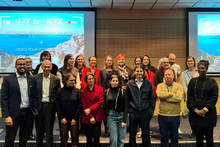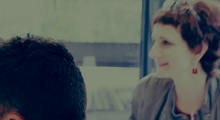A look back at the first Réussites Solidaires: working...

Meeting with Arnaud, Manager of the KEDGE Alumni branch in Kuala Lumpur
After having worked in France, London, and New York, Arnaud Malfoy now works in a start-up in Kuala Lumpur. He is also the manager of the local KEDGE Alumni branch.
Hello Arnaud. Would you tell us about your educational background? What training did you receive before, during, and after your time at KEDGE?
I did a pretty standard track: I did a business prep in Paris then got accepted into KEDGE. I left for Bordeaux, where I did a specialisation in finance followed by a six-month exchange at HEC Montreal - which was probably the best part of my schooling. And after that, I came back to France for six months to do my end-of-studies internship with E&Y.
I left right after that to do a VIE in London with a subsidiary of Renault and did that for 18 months. I liked it very much, but I wanted a change of sector. I was in business finance and I wanted to work in financial markets, so I left that company and was recruited by Tradeweb – a trading platform for electronic bonds and derivatives. I started as an analyst and stayed for there for two and a half years. That went so well that, when a position became open in New York, I was transferred over there and got a promotion. I love New York. It’s an extraordinary city with lots of energy and dynamism, and a relaxed and efficient manner of working. In fact, there’s practically no hierarchy there, but lots of communication and positivity in the way you work. It’s a little opposite of the French way in that sense (laughs). When I left that company, I was a VP.
Tell us why you decided to move here, to Kuala Lumpur.
After having lived 6 years in New York, I wanted to leave my comfort zone and go somewhere else. My wife, who had also previously lived in different countries, felt the same way. We had been considering going to Asia for some time, and it was something that I had personally been imagining since I lived in Bordeaux. I told myself that if I didn’t do it then, I’d never do it. So we embarked on our adventure. We thought we’d spend 6 months in China, learn Mandarin then (given that my brother-in-law and his wife were already there) find work in Hong Kong. At the end of the day, several weeks before we left, an acquaintance of my wife asked if we would be interested in working in Kuala Lumpur for a local company. The job itself seemed perfect: Project Director of a project based between Malaysia, Singapore and Indonesia. The reality did not live up to our expectations because of its extreme bureaucracy, very strong hierarchy, and micro-management that went against all manners of efficiency. I ended up leaving after 6 months. Then I worked as an independent consultant, got some certifications, and finally found a position in a start-up. And I’m still there.
1 minute / 1 kedger : Arnaud, Manager of the KEDGE Alumni Branch in Kuala Lumpur
Published by Kedge Business School Alumni on Tueday, 19 jJune 2018
Would you give us more details about your company and actual position?
This start-up is run by a Malaysian and a Frenchmen. Both came from General Electric, so they have enormous international careers behind them. I’m a project director/consultant on internal and external projects. It’s very interesting and tough at the same time. The areas I work in are very varied. For example, I might provide advice to a hotel chain, a chain of clinics, or an on-line learning platform (e-learning). We have consulting section, and an IT section where we develop our own software programmes internally. For example, we are developing a software programme in the travel field, but adapted for businesses, B to B. It’s projected to launch in the coming months. It’s a big project and a number of clients are interested. The business is developing well. We started off with only three, and now we have some fifteen people working there and it’s only been barely a year. It’s very dynamic and I’m learning an enormous amount. The way I work now has changed a lot compared to the way I did in the United States. I had to relearn lots of things.

What are your plans for the future? For example, where do you see yourself in five years?
I have a lot of projects in mind. In the medium term, I’d like to go somewhere else, and I’ve several ideas for businesses. Malaysia has an enormous number of advantages (petroleum, a very favourable tax system) but it’s handicapped by problems like corruption, the lack of efficiency in the government, and a poorly performing education system. For foreigners, there are numerous restrictions. You have to put 1 million Ringgit ($250,000) if you want to hold 100% of the capital when you create a business. Otherwise you have to have a local partner, and you never know who you are associating with and you can be easily scammed. Additionally, for the medium/long term, it isn’t easy to stay in Malaysia. There aren’t any long-term visas (other than a 10-year visa that is delivered bit by bit), no green cards. It’s almost impossible to get citizenship, and they don’t recognise a double-nationality in any fashion. We are thinking of maybe going to Eastern Europe, to be closer to our respective families (France/EU), and to take advantage of its dynamic economy and better education system for our daughter.

What difference do you see in work culture between France and Malaysia?
At a professional level, it’s certainly more complicated than elsewhere. My previous experiences in the United States or England were much simpler as the cultures are more similar. At the professional level, we speak the same language. Here, there are three communities, so you have to sometimes adjust your discussion depending on which community.
There’s no comparison the manner of working here with that of Europe or the United States. This was a real shock for me when I first got here. Things go much slower. There is a very significant hierarchy, everything must be approved by lots of people, so time is lost. You have to have patience in order to manage projects well. On the other hand, I’ve developed a lot of expertise and know-how in a short time in several areas.

How did KEDGE help you develop and reach your goals?
I had good professors in business finance at KEDGE, and that certainly helped. The alumni network has also been very useful, especially in terms of getting advice and having conversations regarding our fields, or specific companies in particular.
What really opened my mind and the fields of possibility was when I did my academic exchange at HEC Montreal. I met a huge number of brilliant people who spoke several languages fluently. It was there that I realised what I would have to do to enhance my profile. I had had a counter shock when I returned from Montreal. I wasn’t even able get back in the Parisian swing of things, and at the end of three or four months, I told myself that I’d have to leave again. I had widened my perspective of the world enormously, had travelled a lot, and I viewed things completely differently. At my time, I was one of the only ones to begin my career abroad, and to want to stay abroad. Things have changed a lot since then, and it’s practically the rule now. I find it to be an excellent thing, because too often we stay in settings that are typically French and we miss out on a lot of things in terms of personal and professional growth. I think it’s really necessary to leave France and spend 5 – 10 years abroad and then come back. Also, I’ve found that when someone has lived in an Anglo-Saxon country, they have more freedom to think, to take risks. I’m happy to see that KEDGE is one of the top schools in terms of business creation. It’s a super university of life. Of course, there are bound to be failures, and the first time won’t necessarily be a success. But you start over, get better, and succeed. In France, we are trapped into following a certain track, where any change can be fatal to a professional career.
What advice would you give to a student or young graduate who is considering having a Malaysian experience?
Find out as much as possible beforehand. Don’t leave with the naïve belief that you’ll land a job, because the market for foreigners is small. You must get as much advice as possible, speak to those who live or have lived here, and network to the maximum. Avoid sending your CV to job portals because that is useless. You have to approach businesses yourself, contact them, and apply on company websites. I think you will have more luck with foreign companies, especially Australian, American, or European. If you find a job you are interested in, apply directly to the company, and even if there isn’t one listed, you can still contact them because often companies don’t post all of their vacancies.

What have you found in Malaysia that you would never have found in France?
This climate (laughs), that’s for sure. The quality of life is exceptional here, something that isn’t found anywhere but in Asia. We are lucky enough to have a nanny 5 days a week, even at night, for our little girl. That’s impossible to have in Western Europe or in the United States. It’s an enormous benefit. Practically every condo has a swimming pool (editor’s note: condo - condominium, building in co-ownership). It’s great to be able to take a trek when you want to, take a walk in the jungle for a few hours, see all the local wildlife. I’m fully aware what I have is a gift is compared to what there is in France. Another huge advantage is the ability to travel throughout the rest of Asia, to spend a weekend in Cambodia, or go visit friends in Australia.

Would you tell us about your role as the manager of the KEDGE Alumni branch in Kuala Lumpur?
I was manager of the New York branch when I lived there, so it was completely natural for me to ask to be the manager here. However, it’s been much more difficult to interest people because the network is clearly weaker. The first event was a big success because there were a dozen people, then the second time there were only four people, and then I stopped after that because there weren’t enough of us. Finally, I put it aside for a bit, even though I responded to emails from students. I also tried to get some other business schools involved to try to have a certain number of people, but I didn’t get any responses. The problem is that Malaysia is still off the beaten path compared to Thailand or Vietnam, which have both seen an increase in last few years. I’ve just started a KEDGE WhatsApp group that I hope will strengthen our ties and create a support group between alumni in Kuala Lumpur.
Interview conducted in Kuala Lumpur by the Kedge Asian Success, consisting of Romane Clerc, Cyril Colliot and Maud Ribaucourt.
SEE ALL OF PRO-ACT'S INTERVIEWS







0 Comment
You must be logged in to leave a comment.
No comment